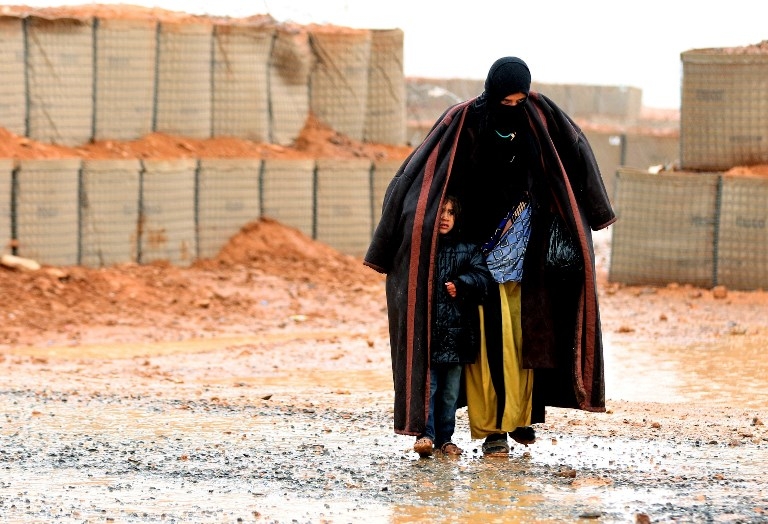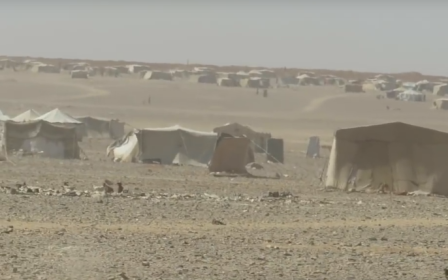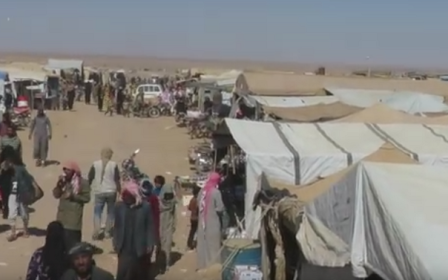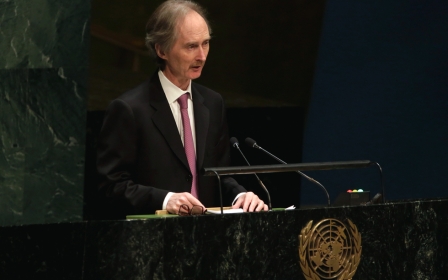Syria's remote Rukban camp receives first UN aid convoy since January

A United Nations aid convoy on Saturday reached the Rukban refugee camp in Syria where thousands of people are stranded in the desert near the border with Jordan, a member of the camp's local council said.
"The first convoys have entered the camp," said Abu Abdullah, a member of the civilian council that runs the camp and has coordinated with the UN on humanitarian aid convoys.
The UN said it was delivering food, sanitation and hygiene supplies, nutrition and health assistance to 50,000 people in Rukban, an area under rebel control, in an operation expected to take three to four days, Reuters said.
The Syrian Arab Red Crescent is also taking part in the convoy, which will also involve an emergency vaccination campaign for 10,000 children against measles, polio and other diseases, a UN statement said.
More than 70 trucks are bringing in more than 10,000 food parcels and bags of flour, as well as clothes for 18,000 children, the Red Crescent said. The aid also includes newborn baby kits for 1,200 children, medicines, medical supplies and nutritional supplements for children and women, AFP reported.
"While this much-needed delivery is an important achievement, a longer-term solution must be found for the many civilians living in Rukban," said Ali al-Zaatari, the UN resident and humanitarian coordinator in Syria.
More than half a million people have died in the Syrian conflict since it began in 2011, and half the pre-war population have fled their homes, including over 5 million going abroad.
Rukban, in the desert near where the borders of Syria, Jordan and Iraq converge, received its last UN aid convoy in January.
A cluster of about 10,800 makeshift tents and mud huts, the camp has been called "one of the most desperate places in Syria," the BBC said.
The UN estimates that 80 percent of the people stranded at Rukban are women and children, while aid groups say that pregnant women at the camp have given birth without basic medical care, according to the BBC.
The camp was last month besieged on the Syrian side of the border by the Syrian army, preventing smugglers and traders from delivering food.
Though a US-backed rebel group controls the area, it abuts Jordan's border and is encircled by the Syrian army.
Jordan has put a block on aid crossing the frontier after allowing the January delivery through its territory and says it should not be held responsible for conditions in the camp.
UN relief trucks had planned to deliver aid to Rukban a week ago after gaining clearance from Damascus, but they were delayed for logistical and security reasons, the United Nations said.
Shortages of food and medicine at the camp have caused at least a dozen deaths in recent weeks. The UN described conditions there as "concerning" and said thousands of lives were at risk.
Abu Karim, a camp resident, welcomed the fresh assistance but said it must be regular to have a lasting effect. "The aid arriving has provided some relief to the displaced, but if it stops and does not continue on a regular basis, the camp will return to its bad state," he said.
He pointed to the lack of health care for the displaced as winter draws close. "The aid entering will solve the food crisis in the camp, but there's still the health issue," he told AFP via a messaging app.
"There's great suffering as we have no doctors, hospitals or even field hospitals or a place for first aid."
Last month, a girl of four months died of blood poisoning and dehydration, and a five-day-old boy lost his life to blood poisoning and severe malnutrition, according to the UN's children agency UNICEF.
To access a basic clinic, residents must cross into Jordan - through a border that has been largely closed since 2016.
Those at the camp began arriving in late 2015 after fleeing areas of Syria previously controlled by the militant Islamic State (IS) group.
They wanted to cross into Jordan, which has taken in 670,000 Syrian refugees since the civil war began in 2011, but the kingdom sealed the crossing at Rukban in June 2016 after several of its soldiers were killed in a bomb attack claimed by IS, the BBC said.
Jordan insisted the camp be supplied from Syria, but did allow occasional aid deliveries until January.
Since Russia entered Syria's war on his side in 2015, President Bashar al-Assad has recovered large areas of territory. IS militants, who once controlled much of Syria, have lost almost all of what they once held. Frontlines between the remaining contested areas appear to have stabilised for now.
Still, many refugees and internally displaced people fear to return home because of poor living conditions, conscription into the military or worry over reprisals.
Middle East Eye propose une couverture et une analyse indépendantes et incomparables du Moyen-Orient, de l’Afrique du Nord et d’autres régions du monde. Pour en savoir plus sur la reprise de ce contenu et les frais qui s’appliquent, veuillez remplir ce formulaire [en anglais]. Pour en savoir plus sur MEE, cliquez ici [en anglais].




